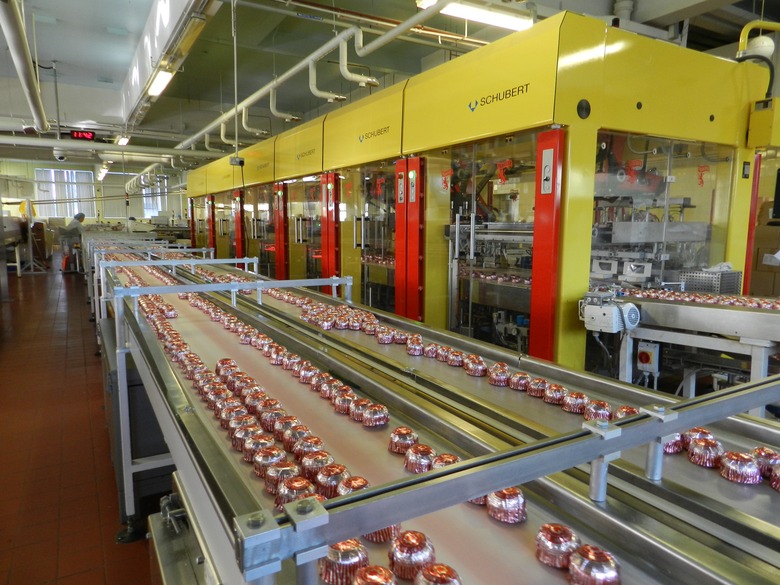This Family-Owned Scottish Bakery Produces Some Of The UK's Most Popular Confections
Tunnock's is the brand behind some of Britain's favorite confections — principally the bakery's famous Teacake (a shortbread cookie topped with meringue and a veil of chocolate) and its Milk Chocolate Coated Caramel Wafer Biscuit (layers of wafer separated by caramel, all encased in a chocolate coating). The bakery produces about three-and-a-half million Teacakes and five million Caramel Wafer Biscuits a week.
I recently visited Tunnock's to learn more about this family-owned enterprise, which has been operating since 1890.
The family members at the helm are very hands-on. Boyd Tunnock, 84, and grandson of company founder Tom Tunnock, is CEO and is in the factory almost every day, running it in all of its aspects. His daughter and son-in-law are directors and actively manage the company. Their son, in turn, joined a couple of years ago as a production engineer, after studying and working for another manufacturer.
The company is proud of the fact that it has changed neither the recipes nor the sizes of its products, which is an important point, considering the outcry that greeted the recent downsizing of Toblerone bars and other confections. "We have never reduced the size and, as for the recipes, we have maintained standards," explains Alan Burnett, the company's export manager. "We do not buy the cheapest ingredients, and, for example, our chocolate is still the same — i.e., chocolate as legally defined, not a chocolate-flavored coating." Tunnock's makes the components of its products from scratch, though some ingredients are bought partially processed, including sweetener, condensed milk, and cocoa butter and solids (they do not buy cocoa beans).
As with most successful large-scale production-based businesses today, the majority of processes are automated for speed, efficiency, and quality. "It can be summed up by saying that we have gone from manual to automated manufacture," said Burnett. "For example, in the beginning, products were individually wrapped, whereas we now have machines capable of wrapping up to 700 items per minute. The automation also ensures that there is significantly less handling of the products."
However, some techniques developed by Tom Tunnock more than a century ago are still in use, and the process of making the products was much more intense than I imagined it would be. There is something almost Hollywood-esque about the manufacturing floor, with its huge vats of chocolate, rows of Teacakes and Caramel Biscuits stretching as far as the eye can see, and a production line of five women, each responsible for adding a layer of wafer biscuit to slabs of chocolate and caramel. A strong, sweet, chocolatey caramel smell fills the air, and follows you around the whole building.
A recent deal Tunnock's made with Aldi and Lidl, the massive German-owned discount supermarket chains, means that production is expanding. "There is not too much to say," according to Burnett, "other than we got both of them about three years ago and they together take more [product] than our previous biggest retailer. Overall, our sales have increased by 50 percent in three years. In effect, it has put a lot of pressure on us. ... To re-adjust, we are spending millions on ... ovens, spreading technology, and the like. We have installed a new Teacake line, increasing our capacity for that item by about 30 percent, and, in May, we will build an extension on to the factory. That obviously means more plant as well as an increase in the workforce."
The company currently employs about 400 people across three shifts. Staff turnover is low, and most of the workers have been here for years, some following their parents and even their grandparents into the bakery.
The U.K. is still the top market for Tunnock's, accounting for 80 percent of sales. The Middle East accounts for 10 percent, and all other markets combined make up the rest. Why do the products do so well in the Middle East? Burnett thinks that it has to do in part with the packaging — other chocolate brands opt for navy or purple wrappers, but Tunnock's signature red and gold stands out. "The story goes," said Burnett, "that Archie Tunnock, son of founder Tom, realized that the product would sell much better in brightly colored packaging and that, once the red and gold stripes came in, sales almost doubled. Certainly, when we got involved in the Middle East in the late '60s, the buyer from the region was in a shop in London, saw the product, and bought it because it stood out. Because we started early, the Middle East is our biggest overseas market." As for the smiling, red-cheeked boy on the package, his origins are lost in the mists of time — but Burnett said that he probably wasn't a Tunnock family member.

